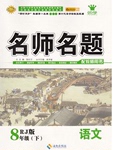题目内容
---The humorous English teacher is famous and well received in our campus.
---Yes, _______.
A. So does Tom B. So tom is C. So it is with tom D. Tom is so
C.
解析:
当描述的情况不只一种的时候,要用so it is with sb 来表示情况的一致性。So+助动词+主语只能表示一种情况的一致性

练习册系列答案
 优学名师名题系列答案
优学名师名题系列答案
相关题目